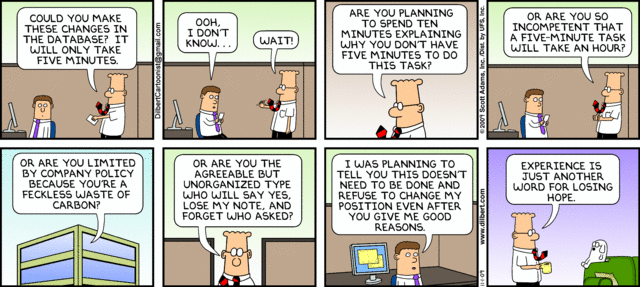Every workplace has them at some point. Among my circle of friends that work in the Bay Area at various tech companies, I’ve heard each one complain about “that one guy” at their office who never does anything but never gets fired. Having one around saps morale, sabotages new hires that may have had great potential, wastes company resources, and can even make your star employees/co-workers leave. Here’s how to spot one.

1.) Produces Little to No Actual Finished Work
Some people might say that managers generally don’t produce, but most good ones do. They can sometimes work in the same capacity as their subordinates while overseeing them. Some produce training materials, workflow processes, and design/strategy documents. These aren’t the final product, but they are feasible things that exist in the real world and point back to their creator.
A toxic coworker produces little to nothing, and makes efforts to prevent themselves from being measured as an individual. They are more concerned with their job title and their spot on the company organizational chart than in creating or improving things. Any tasks they take on will generally be things that make them look busy, but won’t culminate in anything real.

2.) Cannot Function Independently
Even the most minor tasks — like using a search engine to find an answer to a basic question — seem to trouble them. Their co-workers may find themselves tempted to use Let Me Google That For You to answer their questions that they could have easily figured out for themselves.
If the toxic coworker manages others, they will often have little concept of what their subordinates do and how they do it. So if that person calls in sick one day, instead of picking up the slack and doing it themselves, they will tell everyone “Sorry, we have to push back this deadline because ____ is sick today”. They will make this announcement prominently to pass the buck.
3.) Suggests Projects for Others To Do and Doesn’t Manage Them
When a toxic coworker wants to look good, they’ll try to suggest an idea to the rest of the company. They won’t research the idea thoroughly, and they will make a point of having only ideas that don’t create any new work for them. On top of that, the people who would have to perform the work necessary are rarely consulted to see if they don’t already have a half dozen other projects on their plate.
And if — heaven forbid — the project is approved, getting any details that are needed to work on them is often difficult. They will answer even the simplest questions at the last possible minute. They will be vague and inconsistent in their responses. They will not take responsibility for oversight and keeping the project moving.
They often don’t know what they want, but they always want it ASAP. And then, because of their lack of planning or research generally, they change their minds halfway through. Because of this, other workers are expected to compensate by working late, de-prioritizing other projects that had been well-planned and maintained by their stakeholders, and generally burning out.
4.) Unable to Learn New Skills
When a normal worker hits a snag where they don’t know how to do something that is expected of them, they generally take the first step and look it up. 90% of the time my knowledge deficit ends shortly after a quick Googling and I figure out what I’m supposed to do. Toxic coworkers skip this step, and will instead try to get other people to answer their questions.
Shortly after that knowledgeable person answers them, a toxic coworker will most likely say something similar to “That sounds complicated. Would you mind doing it for me? I’d really apreciate it.” Keep in mind, someone who says this once in a while is not necessarily toxic. People who do this every week or every month for the entire time they work there are toxic, especially if they are asking for the same task repeatedly.
They will often find someone in the office that is “too nice” to say no to them. Using them as a patsy to do their job for them, this nice person is saddled with the choice of saying no and appearing rude or just doing their job for them. Patsies will choose the latter. Try not to be a patsy.
5.) Passes Accountability to Others
When something goes wrong, a toxic coworker will be quick to shift the blame on others. They have a sweet deal working in their cushy spot on the org chart, and will defend that position like a rat in a corner. If this means selling out their subordinates or co-workers, so be it.
They also prepare for this eventuality by never giving perfect scores to their co-workers on annual reviews. I know that this is a normal [idiotic] corporate practice to always leave room for improvement, but toxic coworkers will take it a step farther and purposely seek negative comments to make. They want to look better by comparison, and they want the record to appear that way in case someone has to look back for proof.
The Cure?
Good company leadership is supposed to spot these people and remove them like a weed from an otherwise flourishing garden. If you catch one early in their employment at your company, you have a chance to rehabilitate them through training, positive reinforcement and camaraderie. But that window is very small, and once it starts to be noticed by enough other workers, the toxins have already metastasized. Once one of them gets into a management role, it’s hard to locate where exactly the problem is in the chain. The longer it goes on and the larger the company is, the harder they become to detect. This is why it’s important to have an open door policy and conduct periodic 360 degree reviews. That being said, if management has been made aware of a toxic coworker — bad peer reviews, unsolicited complaints about them, missed quotas, etc. — and fails to act, it is a direct reflection on them. Know how to spot a toxic coworker and do your best to eliminate them before they spread! If you manage them, take action! If it’s a co-worker, tell someone above them in the org chart! If it’s your boss, heaven help you. Start hunting for another job and have some interviews pending for when you go over his/her head to complain. If you end up leaving, insist on doing an exit interview with someone above your toxic boss where you tell them the truth.
Have You Seen One?
Do you have any stories about toxic coworkers in the past? Leave a comment below to share and we’ll commiserate.


